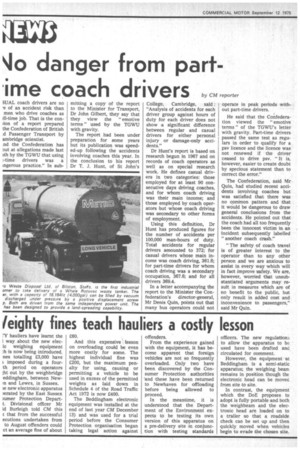4o danger from part
Page 4

If you've noticed an error in this article please click here to report it so we can fix it.
ime coach drivers by CM reporter 3UAL coach drivers are no e of an accident risk than men who drive coaches as ill-time job. That is the con;ion of a report prepared the Confederation of British .d Passenger Transport by ambridge scientist.
.nd the Confederation has oat at allegations made last ith by the TGWU that using :-time drivers was a tngerous practice." In sub mitting a copy of the report to the Minister for Transport, Dr John Gilbert, they say that they view the "emotive terms" used by the TGWU with gravity.
The report had been under preparation for some years but its publication was speeded-up following the accidents involving coaches this year. In the conclusion to his report Dr T. J. Hunt, of St John's College, Cambridge, said : "Analysis of accidents for each driver group against hours of duty for each driver does not show a significant difference between regular and casual drivers for either personal injury or damage-only accidents."
Dr Hunt's report is based on research begun in 1967 and on records of coach operators as well as on special research work. He defines casual drivers in two categories: those employed for at least 90 consecutive days driving coaches, and for whom coach driving was their main income; and those employed by coach operators but whose coach driving was secondary to other forms of employment.
Using this definition, Dr Hunt has produced figures for the number of accidents per 100,000 man-hours of duty. Total accidents for regular drivers amounted to 372; for casual drivers whose main income was coach driving, 361.6; for part-time drivers for whom coach driving was a secondary occupation, 367.6; and for all drivers 369.4.
In a letter accompanying the report to the Minister the Confederation's director-general, Mr Denis Quin, points out that many bus operators could not operate in peak periods without part-time drivers.
He said that the Confederation viewed the ' emotive terms" of the TGWU's letter with gravity. Part-time drivers passed the same test as regulars in order to qualify for a psv licence and the licence was not renewed if the driver ceased •to drive psv. " It is, however, easier to create doubt by specious statement than to correct the error."
The Confederation, said Mr Quin, had studied recent accidents involving coaches but was satisfied that there was no common pattern and that it would be dangerous to draw general conclusions from the accidents. He pointed out that the coach had all too frequently been the innocent victim in an incident subsequently labelled "another coach crash."
"The safety of coach travel is of greater interest to the operator than to any Other person and we are anxious to assist in every way which will in fact improve safety. We are, however, worried that unsubstantiated 'arguments may result in measures which are of no benefit to the public, but only result in added cost and inconvenience to passengers," said Mr Quin.
















































































































